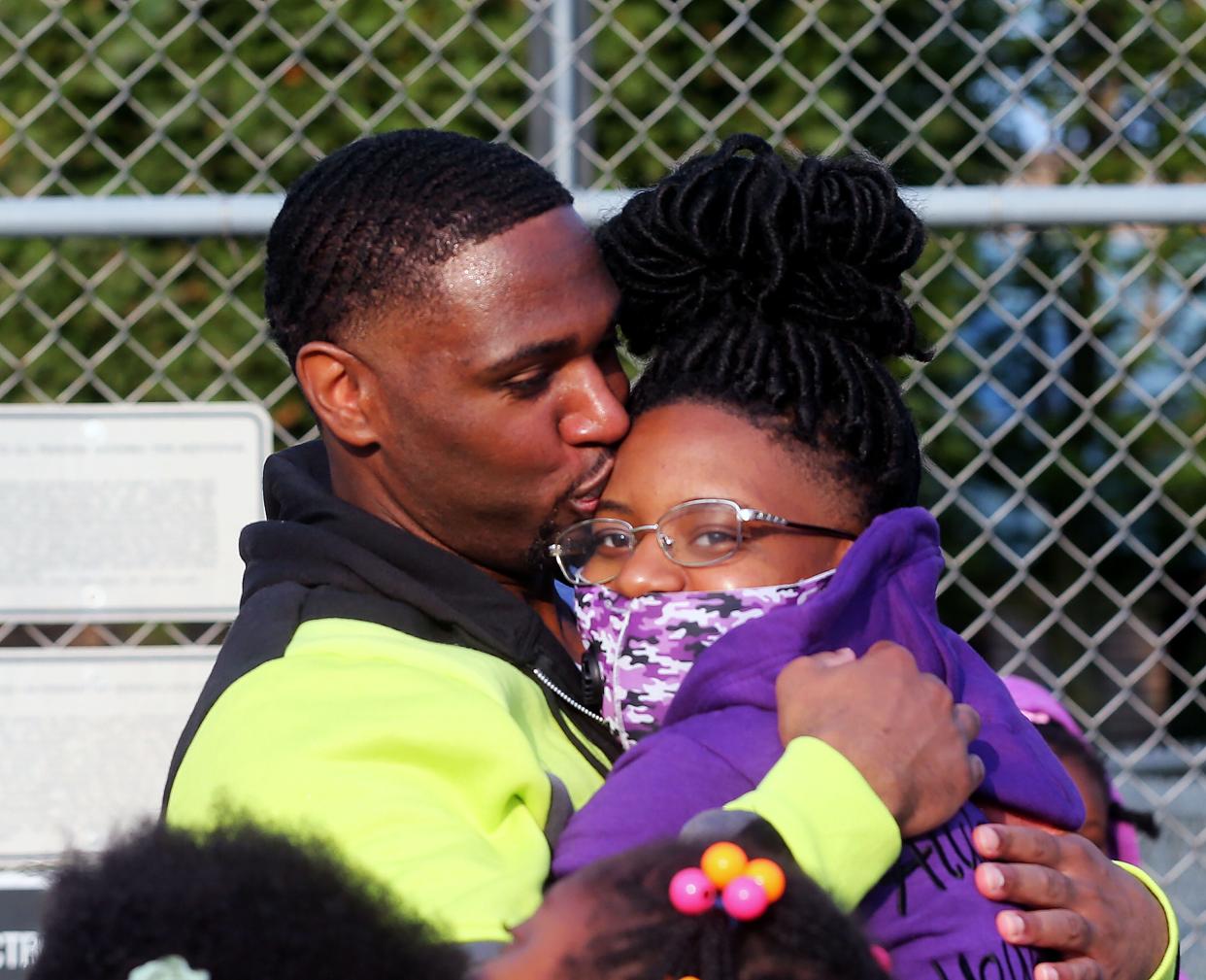Trust but verify: Why reporters knock on doors
Fourteen years after 7-year-old Alexis Patterson disappeared in Milwaukee in 2002, a man in Ohio told police and reporters he believed his ex-wife could be the missing girl.
Ohio police took a DNA sample from the woman and sent it to Milwaukee via FedEx. Because Milwaukee officers didn’t collect it personally, both the man and Alexis’ mother, Ayanna Patterson, harbored doubts about the results.

In episode six of the true-crime podcast Unsolved, reporters traveled to Ohio to verify that the DNA sample was properly collected. The reporting process included knocking on doors of the ex-wife, her boyfriend and her parents. The reporters’ presence angered her mother, who shouted: “Why are you doing this?”
Why do reporters knock on people's doors?
In September 2002, a few months after I started working at the Milwaukee Journal Sentinel, a group of mostly teenage boys beat a neighborhood man to death on his porch.
The editors sent me and another reporter to the high-crime neighborhood to try to speak with the boys’ parents. Some didn’t answer their doors. Some answered but refused to talk. A few invited us inside, trusting us to tell their families’ stories during what was undoubtedly one of the most difficult times of their lives.
Here’s the top of our story, published four days after the crime:
From the first reports that a mob of children beat a man to death to the recent images of some of the accused boys crying in court, one question has come up repeatedly:Where were the parents?
The answers are many.
They were asleep, at work, in prison or dead. All were battling challenges such as unemployment, lack of education, disabilities, drugs or criminal pasts. Court and police records would later reveal that at least seven of the parents had been convicted of felonies. At least six had spent time behind bars. One was stabbed to death outside a methadone clinic.
But the night Charlie Young Jr. was beaten, some of his alleged killers' parents were wide awake, and say they were trying to keep their kids out of trouble the best way they knew how.

One of them, Louise McCullum, stood up from her kitchen table recently, crying as she thought about the question that has come up again and again since her 13-year-old son was charged with first-degree reckless homicide.
Where were the parents?
"I was right here," she says.
Giving voice to the voiceless
As a reporter, calling grieving families is my least favorite part of the job. Knocking on doors unannounced is a close second. I can’t imagine what it would be like to live through some of the horrible things I’ve written about. The last thing I want to do is further traumatize people. But over the years, I’ve learned that for some people, telling their stories can help them heal. If you ask journalists why we do this job, one of the most common answers is: “To give voice to the voiceless.” Yes, it’s cliché. But it’s also true.

In the aftermath of that beating more than two decades ago, a false narrative had begun to take hold: The crime occurred because none of the parents were paying attention. Because we knocked on their doors, those families had a chance to speak their truth. In sharing their stories, they helped educate readers about problems facing poor families that can contribute to crime and violence.
Additional reporting, including an update about one of the perpetrators published earlier this year, has contributed to the community conversation about crime, punishment, prevention and redemption.
How do reporters hold public officials accountable?
In investigative reporting, knocking on doors also can help hold public officials accountable. When I was in journalism school 30 years ago, we were taught that reading police reports was generally the best way to uncover the truth about what happened at a crime scene. Historically, police reports have been considered so trustworthy that reporters who quote from them are protected from civil liability in libel suits – even if the information turns out to be false.
It took about 10 years of working as a journalist before I realized this wasn’t true. One of my colleagues, John Diedrich, had received a tip that a police officer had sexually assaulted several women he’d arrested for prostitution. Diedrich obtained the reports of an internal affairs report clearing the officer. The reports contained statements from witnesses that backed up those findings.
When Diedrich knocked on their doors, the witnesses gave him accounts that didn’t match the reports – and backed up the women’s claims of assault. The officer was later convicted of multiple crimes and sentenced to prison, in part because of the reporter’s work.
Las Vegas reporter Jeff German was killed for doing his job
For the most part, police and public officials don’t like it when reporters try to expose their misdeeds. In the most extreme example in the U.S. in recent history, a former county official is charged with fatally stabbing Las Vegas Review-Journal reporter Jeff German, who had filed a records request for his emails.
More: Remembering Jeff German
In Milwaukee, where I worked at the paper for 20 years and still live, several reporters have drawn the ire of authorities. While serving as Milwaukee County Sheriff, David Clarke posted investigative reporter Dan Bice’s home address on the sheriff’s department website and Facebook page, urging his supporters to confront Bice about his reporting online. Several did – including one who banged on the door when Bice’s teenage daughter was home alone. A former district attorney, Bice said, once pulled a gun on him.
As described in the podcast, my work as an investigative reporter has led to some tense situations with police. An officer once followed me and my son, who was younger than 5 at the time, through a supermarket near my house. Another cop posted a violently photoshopped picture of me on Facebook, saying I deserved “every bad thing that can happen, up to and including a slow and painful death.” When a different officer made a hit list, the cop who informed me that my name was on it sounded gleeful – I’d previously reported on a 911 call his wife made for alleged abuse.
Several journalist friends of mine have been arrested while covering protests or police acts of violence, including photojournalist Kris Wentz-Graff, who was carrying multiple cameras at the time. Her press ID is clearly visible in a photo taken as she was being handcuffed.
What should you do when a reporter knocks on your door?
In my experience, it’s less common for private citizens to call the police on reporters.
Bice says it’s happened to him only twice – both times with Cary Spivak, with whom he used to write an investigative column. And both times, the police came to the newsroom the following day to talk with their editors.
Just as often, people have wanted to talk. A state legislator under investigation for misconduct invited reporters in and introduced them to his daughter, who wanted to pursue a career in journalism.
“You definitely want to get their side of the story,” Spivak said. “It’s a lot harder to close the door on somebody than to hang up the phone. If you knock on the door, you have a much better chance of getting them to talk.”
For me and for my reporting partner on Unsolved, Ashley Luthern, the trip to Ohio marked the first time anyone had called the police on us. And Lisa’s mom didn’t just call to complain. She told the police we had been trying to break into her house. Then she told us her husband would be right out, ensuring we were still there when the officers arrived.
We would not have lingered if we'd known she wanted us gone. All she had to do was ask us to leave, and we would have. Her extreme reaction tells me she probably has some lingering trauma surrounding the events of 2016, when Lisa’s ex-husband first alleged that she might be Alexis.
I'm grateful the
Learn more about the Alexis Patterson case by listening to the true-crime podcast Unsolved.
Contact Gina Barton at (262) 757-8640 or gbarton@gannett.com. Follow her on Twitter @writerbarton.
This article originally appeared on USA TODAY: Knocking on a door isn't illegal. It's how reporters find the truth.
